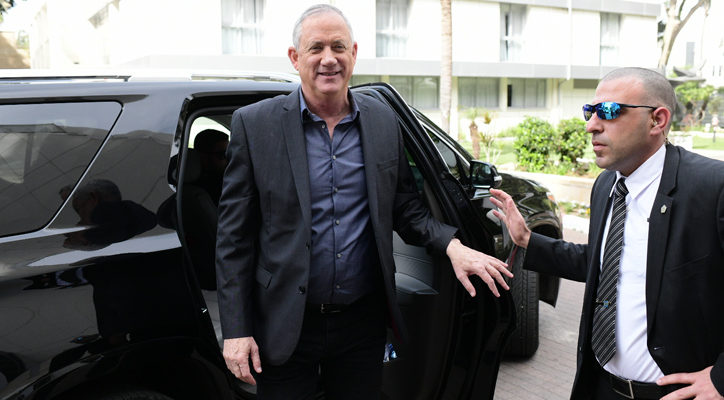Blue and White appears serious about relying on the Arab Joint List to gain a majority and oust Netanyahu.
By David Isaac, World Israel News
In a controversial move, Benny Gantz, leader of the Blue and White party, took his first steps toward forming a government that would rest on the support of the Arab Joint List, meeting with leaders of that party on Monday.
Gantz said he “plans to establish a government that will serve all Israeli citizens, Jews and Arabs, and act to prevent a fourth election campaign.”
It is unlikely that the Joint List will be part of the government but rather support it tacitly from outside, meaning that the government would be a “minority government,” officially ruling with less than 61-seats in the 120-seat Knesset.
The glue drawing Blue and White and the Joint List together is the desire to oust Prime Minister Benjamin Netanyahu. The Joint List won 15 Knesset seats in the March 2 elections.
Israel’s Channel 13 reports that Ayman Odeh, chairman of the Joint List, said after the meeting, “We are committed to our goal of replacing Netanyahu’s legacy and it begins by honoring the united voice of the Arab public and our Jewish partners.”
Odeh also said, “I spoke with Benny Gantz and made it clear to him that the Joint List would work to advance the interests of all citizens as a united faction made up of its four components.”
By four components, Odeh referred to the factions of the Joint List, which is comprised of four Arab-majority parties: Ta’al, Hadash, Balad and the United Arab List.
Odeh underscored that his party would move as a united front given that one of its partners – Balad – was notably absent from the meeting.
The three Israeli-Arab leaders that did attend were Ayman Odeh, chairman of the Joint List and leader of Hadash, Ahmed Tibi, head of Ta’al, and Mansour Abbas, head of the United Arab List.
Although all of the Arab parties oppose Israel as a Jewish state, instead supporting the idea that it should be a “state of all its citizens,” Balad is considered the most extreme of the four factions.
In December, Israel’s Central Elections Committee banned one of its members for her social media posts supporting terrorists. The Supreme Court overturned that decision in February.
The Knesset Member, Heba Yazbak, said of Balad’s absence at the meeting, “If Gantz wants to continue down Netanyahu’s path, he is going exactly in the right direction – we have already seen where the policy of divisiveness and delegitimacy leads. This is precisely the policy we are working to change.”
Gantz, who only recently entered politics, is breaking with long-standing policy on both sides of Israel’s political aisle of not relying on Arab parties in the formation of a government.
Gantz, a former IDF chief of staff, along with the other leaders of Blue and White, promised repeatedly during the election campaign that they would never rely on Arab parties.
Two Knesset members from the Blue and White list, Yoaz Hendel and Zvi Hauser, who both formerly worked for Benjamin Netanyahu, reportedly oppose partnering with the Joint List.
According to Israeli media, the two got into a shouting match with party leaders on Sunday over the issue.
Both belong to Telem, one of the parties that makes up Blue and White. Telem’s leader, former IDF Chief of Staff Moshe Ya’alon, said he expects that the two will quit the Knesset should a vote come up in Israel’s parliament in support of a minority government.
On Monday, Gantz also met with Avigdor Liberman, chairman of the Israel Beiteinu party. Formerly a reliable partner of Israel’s Right, Liberman broke with Netanyahu after the first Knesset election in April 2019.
If Blue and White succeeds in cobbling together a coalition with the Arab List, Israel Beiteinu and Labor-Gesher-Meretz, it will have 62 Knesset seats, beating the right-wing bloc which has 58.
Pundits have pointed out that even if Hauser and Hendel remain opposed, Blue and White still has a majority of 59-58.
Netanyahu has blasted Blue and White’s willingness to deal with the Arab List. Counting just Israel’s Jewish voters, he noted that the distance between Left and Right only widened in the last elections in the Right’s favor.
That gap stands at 11 Knesset seats.





